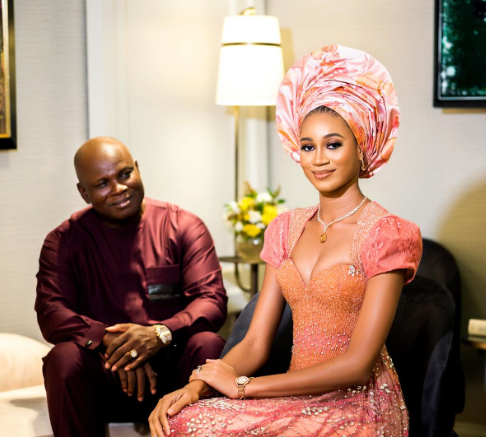Where Do I Start Crying From? A Former Beauty Queen, Mitchel Ugochi Ukachukwu { Ikukuoma’s wife } laments after finding out her husband uses her face wash as bathing and hand soap
“Not me finding out my husband uses my face wash as bathing soap and hand soap… where do I start crying from??”
With that single Instagram Story update, Miss World Nigeria 2017 and former Most Beautiful Girl in Nigeria (MBGN) Universe, Mitchel Ihezue, sent the Nigerian internet into a collective spasm of laughter, empathy, and slightly confused introspection.
How does a billionaire not know the difference between La Roche-Posay face wash and Lux bar soap? Why do men—whether broke or balling—insist on sabotaging women’s skincare routines? And most importantly: how does a beauty queen marry a politician-businessman and still find herself hiding her toner like a state secret?
This story is not just about a face wash—it’s about the invisible lines between wealth and cluelessness, love and irritation, and beauty culture versus male nonchalance in Nigerian marriages.
YOU MAY READ
Anambra 2025: APC Weighs Options as Running Mate Decision Looms for Prince Nicholas Ukachukwu
When Mitchel Ihezue married Prince Nicholas Ukachukwu in late 2023, social media exploded. A former beauty queen marrying a businessman-politician more than twice her age? That alone was gist. Add the fact that Nicholas was contesting the 2025 Anambra Governorship election under the APC ticket—and you had a perfect storm of speculation, side-eyes, and tribal WhatsApp voice notes dissecting the union.
But two years later, the fairy tale encountered its first public scratch—not in court, not in a political scandal, but in the privacy of their marble-tiled, chandeliered bathroom. Her husband, she discovered, had been using her precious face wash as both body wash and hand soap.
And like a true millennial queen, she didn’t yell. She didn’t call a family meeting. She didn’t even write a bitter caption. She simply posted:
“Not me finding out my husband uses my face wash as bathing soap and hand soap. Where do I start crying from?? 😩😭”
It was the “Where do I start crying from?” that sealed it. A cry that was not really a cry. A scream into the void of Nigerian womanhood. A shared trauma that transcended class.
It is a well-documented Nigerian female experience: your boyfriend—or husband—walks into the bathroom, sees a pink bottle, and squeezes it with zero questions asked.
Is it a leave-in conditioner? He uses it as body lotion. Is it a foaming enzyme exfoliator? He uses it to wash his beard. Vitamin C serum? He thinks it’s dettol.
The idea that a billionaire like Prince Nicholas, who can reportedly bankroll an entire cosmetic startup if he felt like it, is using his wife’s face wash as if it were Dettol Cool… hits a special kind of nerve.
YOU MAY READ
Prince Nicholas Ukachukwu Clinches APC Gubernatorial Ticket for Anambra 2025
“Some of these men are billionaires o, but they still think Nivea and Shea Butter solve all skin problems,” said Chioma, a Lagos-based beauty influencer. “Their default setting is ‘everything is soap’ unless you put barbed wire around it.”
And it’s not about the price of the face wash. It’s the principle. It’s the fact that after you curate a 7-step skincare routine from Sephora, Skin by Zaron, and a prayer from your grandmother, one man can waltz in and erase all your efforts in 30 seconds.
Mitchel’s public lament is not merely comic relief. It’s an SOS from the trenches of marriage, luxury, and absurdity.
The sun is harsh. The air is dusty. The water is hard. The expectations are sky-high. Combine that with Lagos pollution, makeup demands, and the glow-up economy on Instagram—and you understand why women are investing in The Ordinary, Paula’s Choice, Murad, and even home-blended rice water toners.
In an average Nigerian relationship, a woman’s bathroom shelf is a museum. A mix of science, luxury, and small hustle. Meanwhile, the man’s shelf? Usually just toothpaste and Old Spice.
But here’s the twist: it is always the minimalist man who suddenly falls in love with the woman’s stuff. He won’t ask. He won’t even apologize. He’ll just finish it.
“I once dated a guy who finished my 18k Vitamin C serum and asked me if it was ‘the new Dettol liquid soap’,” said Ifeoma, a pharmacist in Abuja. “I almost packed my bags.”
For someone like Mitchel, whose glow is both personal and professional, a face wash isn’t just a cleanser—it’s a career investment.
There’s something intimate about bathrooms in a marriage. Something raw and revealing.
When women marry, they often bring their beauty culture with them: silk bonnets, shower caps, Korean sheet masks, body butters, exfoliating gloves, and at least one lavender-scented candle. Men? They bring towels and confusion.
Mitchel’s face wash saga hits because it embodies something we all know: sharing is beautiful, until it becomes careless. Love is patient, love is kind—but should it also be oblivious?
YOU MAY READ
I Was Even A God Father To Peter Obi When He Was A Governor APC Guber Candidate Boasts On His Capacity To Dislodge Soludo And Capture Anambra State In Nov 8
“She knew he wasn’t Gen Z when she married him,” one commenter wrote. “But she didn’t know his skin routine stopped in 1985.”
Another user said: “My dad still uses Lux and Delta soap interchangeably. This is our national male problem.”
But at its core, Mitchel’s lament reveals the unique imbalance of domestic life in Nigeria, even among the wealthy. For all the glamor and glass, some habits remain stubbornly… unbothered.
The reactions to Mitchel’s post were golden:
@sugarbaby_noni: “My sister, I locked my bathroom the day my husband used my shea butter for frying plantain. Cry in peace.”
@blaqskincarebabe: “Let him pay bride price again. This time, in CeraVe and Ordinary products.”
@MbahChuka: “Imagine marrying into billions and still rationing skincare products. God, abeg.”
@Ada_Mmesoma: “That ‘where do I start crying from?’ is the most poetic thing I’ve heard this year.”
Soon, the face wash story became more than a trending tweet. It became a case study in Nigerian gender dynamics. A mirror held up to our expectations of men and marriage. A skit-worthy moment for comedians. And even a marketing opportunity for skincare brands.
Rumors swirled that a popular beauty brand reached out to Mitchel for a sponsored “His & Hers” skincare campaign. If true, her face wash misfortune may yet become a glow-up for the entire nation.
In truth, it’s time to address the crisis: Nigerian men need skincare literacy.
Why do many men, even the high-flying ones, think every bottle is “just cream” or “just soap”?
“I’m not even mad he used it,” said Zainab, a Lagos-based therapist. “I’m mad he didn’t even notice the difference in texture, scent, or effect.”
This is not about poverty or illiteracy. This is about a generational refusal to engage beauty rituals seriously.
“You can’t marry a beauty queen and act like you live in a village,” said another online commenter. “Her face is a national treasure, not a washboard!”
It may sound dramatic, but Mitchel’s outcry speaks to the silent battle many women face in domestic partnerships—where their effort meets their partner’s apathy, again and again.
Mitchel Ihezue is not just another influencer. She is Miss World Nigeria. An international model. A beauty entrepreneur. A woman whose face is literally part of her brand.
For her to wake up and discover her luxury cleanser is now bathing the same man who likely applies vaseline once a week—and nothing else—is spiritual warfare.
It’s like buying a bottle of Dom Perignon, and someone uses it to boil yam.
But beneath the humor lies a question: How much does Nigerian society expect women to sacrifice for harmony in marriage? Even the right to protect a face wash?
Mitchel, by sharing her lament with grace and subtle shade, revealed something poignant. Even in wealth. Even in status. Even in love. You might still need to put your favorite cleanser on lockdown.
Somewhere in Anambra State, a governorship candidate may now be wondering why his wife is suddenly padlocking the bathroom cabinet. Somewhere, another woman is quietly drawing lines with masking tape on all her beauty bottles: “DO NOT TOUCH.”
Mitchel’s story is now folklore. It’s a tale of modern Nigerian marriage. It’s a meme. A moral lesson. A national talking point.
More importantly, it’s a cultural reset. A reminder that love is not blind—it just sometimes needs separate skincare shelves.
So, where should Mitchel start crying from?
Honestly, she shouldn’t cry at all. She should pour herself a glass of chilled rosé, post another flawless photo with her glowing skin, and tag the brand of face wash.
Because the real glow-up? Is making the whole country laugh, think, and fall in love with your story… over one bottle of face wash.





